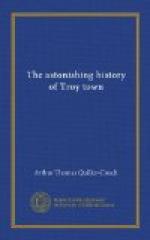Sophia (singing): “Oh, breathe but a whispered command.” Calypso: “One, two, three, four.” Sophia: “I’ll lay down my life for thee!” Calypso: “One, two, three, four.”
—the effect of which upon strangers has been known to be paralysing, though we who were cumeelfo pretended not to notice it. But Sophy could also accompany her own songs, such as, “Will you love me then as now?” and “I’d rather be a daisy,” with much feeling. She was clever, too, with the water-colour brush, and to her we owe that picture of “_ H.M.S. Calypso_ in a Storm,” which hangs to this day over the Admiral’s mantelpiece.
I could dwell on this evening for ever; not that the company was so large as usual, but because it was the last night of our simplicity. With the next morning we passed out of our golden age, and in the foolishness of our hearts welcomed the change.
It was announced to us in this manner—
The duets had been beaten out of Miss Limpenny’s piano—an early Collard, with a top like a cupboard, fluted in pink silk and wearing a rosette in front; the performers, on retiring, had curtseyed in acknowledgment of the Vicar’s customary remark about the “Three Graces “; the Admiral had wrung from his double-bass the sounds we had learnt to identify with elfin merriment (though suggestive, rather, of seasick mutineers under hatches), and our literary collector, Mr. Moggridge, was standing up to recite a trifle of his own—“flung off”—as he explained, “not pruned or polished.”
The hush in the drawing-room was almost painful—for in those days we all admired Mr. Moggridge—as the poet tossed back a stray lock from his forehead, flung an arm suddenly out at right angles to his person, and began sepulchrally—
“Maiden”—
(Here he looked very hard at Miss Lavinia Limpenny.)
“Maiden, what dost thou
in the chill churchyard
Beside
yon grassy mound?
The night hath fallen,
the rain is raining hard,
Damp
is the ground.”
Mrs. Buzza shivered, and began to weep quietly.
“Maiden, why claspest
thou that cold, cold stone
Against
thy straining breast?
Tell me, what dost thou
at this hour alone?
(Persuasively)
The lambs have gone to rest.
The maiden lifted up
her tearful gaze,
And
thus she made reply:
‘My mother, sir, is—’”
But the secret of her conduct remains with Mr. Moggridge, for at this moment the door opened, and the excited head of Sam Buzza, the Admiral’s only son, was thrust into the room.
[Illustration: “Maiden, what dost thou in the chill churchyard—“]
“I say, have you heard the news? ‘The Bower’ is let.”
“What!”
All eyes were fixed on the newcomer. The Vicar woke up. Even the poet, with his arm still at right angles and the verse arrested on his lips, turned to stare incredulously.




